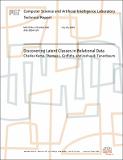Discovering Latent Classes in Relational Data
| dc.contributor.author | Kemp, Charles | |
| dc.contributor.author | Griffiths, Thomas L. | |
| dc.contributor.author | Tenenbaum, Joshua B. | |
| dc.date.accessioned | 2005-12-22T01:36:09Z | |
| dc.date.available | 2005-12-22T01:36:09Z | |
| dc.date.issued | 2004-07-22 | |
| dc.identifier.other | MIT-CSAIL-TR-2004-050 | |
| dc.identifier.other | AIM-2004-019 | |
| dc.identifier.uri | http://hdl.handle.net/1721.1/30489 | |
| dc.description.abstract | We present a framework for learning abstract relational knowledge with the aimof explaining how people acquire intuitive theories of physical, biological, orsocial systems. Our approach is based on a generative relational model withlatent classes, and simultaneously determines the kinds of entities that existin a domain, the number of these latent classes, and the relations betweenclasses that are possible or likely. This model goes beyond previouspsychological models of category learning, which consider attributesassociated with individual categories but not relationships between categories.We apply this domain-general framework to two specific problems: learning thestructure of kinship systems and learning causal theories. | |
| dc.format.extent | 12 p. | |
| dc.format.extent | 13382538 bytes | |
| dc.format.extent | 572002 bytes | |
| dc.format.mimetype | application/postscript | |
| dc.format.mimetype | application/pdf | |
| dc.language.iso | en_US | |
| dc.relation.ispartofseries | Massachusetts Institute of Technology Computer Science and Artificial Intelligence Laboratory | |
| dc.subject | AI | |
| dc.subject | learning | |
| dc.subject | categorization | |
| dc.subject | relations | |
| dc.subject | kinship | |
| dc.title | Discovering Latent Classes in Relational Data |
